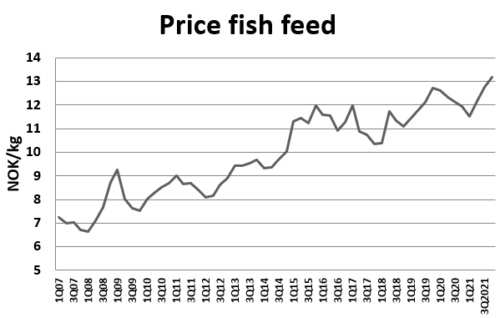Record-high salmon prices have so far protected major salmon producers from the impacts of the high costs of fish feed, fuel and transport, but a different story is emerging for small farmers.
The price per kilogram varies by diet and by feed company, but California-based steelhead trout farmer Katie Harris estimates feed prices have increased by over 6 percent since the start of the year.

“We have passed along price increases to our customers but not just because of feed. The dramatic increase in fuel prices has affected us just as much if not more than feed prices. I know it is bad everywhere, but the cost of diesel in California is ridiculous and it is having a very real impact on our bottom line and our ability to deliver to our smaller customers,” Harris says.
She’s adopting a wait-and-see attitude before deciding on prices for next year’s contracts “until we have a better feel for what feed and fuel prices will be next winter when our busy season kicks off,” she says.
In British Columbia, another steelhead farmer says he’s switched to a local feed producer to reduce expenses.
“When I left EWOS about a year ago I was paying CAD$2.84/kg (US$2.22) for 5 mm steelhead/trout floating feed. And, $3.21/kg (US$2.51) for 3 mm steelhead/trout floating feed. Approximately a year previous to that I was paying about $2/kg (US$1.56) for 5 mm floating from EWOS. Last year, when I switched to Taplow I was paying $2.15/kg (US$1.68) for 5 mm sinking steelhead feed. Currently I am paying $2.26/kg (US$1.77) for the same feed from Taplow,” says Larry Albright, a steelhead farmer in Langley, BC.
Albright now also sells his harvest directly to fish shops instead of going through brokers.
“Feed is 70 percent of the farm’s cost. One by one, small farmers are pulling out. They can’t afford it,” he says.
Animal feed producers have no choice but to raise their prices to stay afloat.
For British Columbia feed producer Taplow Ventures, drought in the wheat-producing areas of Canada and a massive flood that cut off roads have added to the challenges of the pandemic-driven inflation.
“Our feed mill is in Chilliwack (east of Vancouver) and in November when we had the mudslides and the floods it was isolated from Vancouver and anything East so that had a significant impact to our supply chain,” says company executive Wendy Vandersteen.
“The drought in the Prairies last year limited wheat crops and when you have a limited resource that everybody is trying to access, the prices increase.”









